 Networks, Narratives and Nations
Networks, Narratives and Nations Book contents
9 - Cultural Nationalism and the Invention of Dutch Literary Icons
Published online by Cambridge University Press: 16 November 2022
Summary
Abstract
A transnational approach shows that many works of the Dutch literary canon that have been characterized as typically Dutch have in fact foreign origins. This can be seen by examining several icons from Dutch literature: Jantje, created by Hieronymus van Alphen; Sara Burgerhart, invented by Elisabeth Wolff-Bekker and Agatha Deken; and Oene van Sneek, a fictional character from a poem by Hendrik Tollens. Although it is the literary scholar's task to remind readers that these authors did not express the Dutch nation's soul or spirit, it remains of vital importance that scholars keep stressing the need for an in-depth knowledge and the uniqueness of Dutch historical literature to policy advisors, board members of universities and the broader public.
Keywords: Dutch; literature; national identity; transnationalism; canonization
“Nothing is more international than nationalism.” This quote, taken from an interview with the Dutch-Limburgish literary scholar Joep Leerssen, perfectly describes the paradoxical nature of any attempt to single out a nation's unique character. Demonstrating the exclusiveness of national traditions, cultural habits and iconic literary figures is inevitably part of a dynamic, international process: nations are always interdependent in successfully defining and redefining their cultural boundaries. In particular, neighbouring countries are indispensable points of reference. For example, what makes the Danes typically Danish can only be expressed by contrasting them to the Swedes and Norwegians. As Leerssen puts it: there is no such thing as a “durable, objective entity called ‘Germany,’ but rather the set of changeable images of a hypothetical and historically variable Germany; in studying these images we must place them in their discursive environment.”
Nevertheless, the remnants of nineteenth-century political, cultural and Romantic nationalism remain omnipresent in our present-day society. We are surrounded by all sorts of manifestations of what Michael Billig calls “banal nationalism”: everyday practices, cultural symbols and habits of language, which ingrain nationality in people's brains. The persistence of these imaginative national patterns can be explained by the fact that from early childhood we learn to think in simple schemes, which draw clear boundaries between nations, peoples and languages.
- Type
- Chapter
- Information
- Networks, Narratives and NationsTranscultural Approaches to Cultural Nationalism in Modern Europe and Beyond, pp. 117 - 126Publisher: Amsterdam University PressPrint publication year: 2022


